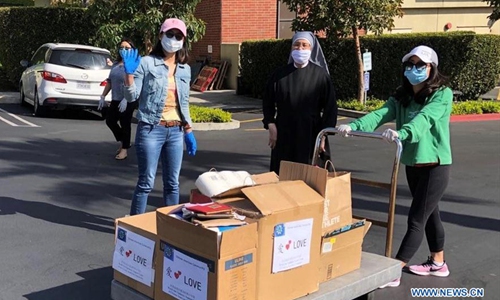Love and hope amidst ignorant racism
By Rong Xiaoqing Source:Global Times Published: 2020/5/7 16:18:39

Chinese American volunteers deliver donations to the Little Sisters of the Poor, a senior center for low income seniors in the city of San Pedro, Southern California, the United States, on April 2, 2020. As COVID-19 cases skyrocket in Southern California in the Unites States, Chinese Americans who saw Chinese people undergo hardship during the outbreak in China are stepping up to help their American neighbors as well.Photo:Xinhua
The novel coronavirus has made the world a worse place and the recovery could be long and painful. While many people are being dragged through the mud in the chaos, Chinese living in the US have additional turmoil to deal with.
Anti-Asian violence has been rising exponentially in this country. The Asian Americans Advancing Justice and several other rights organizations set up a website called "Stand Against Hatred" to document hate attacks against Asians. It has detailed more than 1,600 such incidents in the past two and a half months.
In New York, the Commission on Human Rights has received more than 280 COVID-19 related complaints in the past three months, and 40 percent concern allegations of attacks against Asians.
The wave of hate was encouraged by President Donald Trump's description of COVID-19 as the "Chinese virus." According to the Asian Pacific Policy and Planning Council, which has been tracking hate crimes against Asians as well, incidents surged to 650 in the week when the president insisted on using the term in mid-March.
Trump has dropped his use of the description now but in recent weeks he has stepped up his anti-China attacks.
With a presidential election looming and criticism about Trump's response to the pandemic mounting, his administration won't likely give up promoting the largely unfounded claim that the virus came from a bio lab in Wuhan. And China, with its by now established tough stance, won't likely swallow any blame, let alone open itself up to any kind of outside investigation involving the Americans and the Europeans. A propaganda war could easily escalate into something worse.
This gloomy perspective deeply worries Chinese who were born in China and now live in the US with roots in both countries, the last thing we would like to see is the places we both call home engaging in an ugly shouting and scratching match, or worse.
Even those American-born Chinese who are trying to make it clear they weren't born in China and are as American as apple pie are unable to distance themselves from the nastiness.
A Trump campaign ad used the image of Gary Locke, an American-born Chinese who was the former governor of Washington state and former US ambassador to China, in an attempt to portray presumptive Democratic rival and former vice president Joe Biden as being far too cozy with Beijing.
And the average racist hater out there on the street? They normally do not have the intelligence to differentiate between people by anything other than their skin color.
The only thing that soothes me in this distressing time is talking to the Chinese people (wherever they were born) who have managed to counter the unfairness and uncertainty the world throws at them with unconditional kindness.
For example, Mei Huang, a retired textile importer in New Jersey, jumped in early to fight against the pandemic. At first, she mobilized her friends who operate clinics in the US to order protective equipment so that she could donate it to Wuhan. And then, when the virus started spreading in the US, she used her connections in China to find 200,000 N95 masks and 5,000 surgical gowns for American medical workers and first responders.
The money was raised by Chinese American organizations and from her own family.
Huang is only one of many Chinese in the US working relentlessly on this. According to the Washington D.C. based Chinese Americans United for America, 670 Chinese community organizations have been involved in efforts to donate safety equipment to American facilities since March. Together, they raised $15 million and donated millions of items to American medical workers and first responders.
But much more kindness is not counted in the stats.
For example, in my own neighborhood in Queens, New York, a group of Chinese moms learned via their WeChat group that doctors and nurses in the ICUs of Mount Sinai West, a hospital where the husband of one mom works, were often too busy to get lunch.
They started delivering lunches to the 35 ICU doctors and nurses either by buying them from restaurants using money they raised among family members and friends or by cooking the food at home themselves.
Without a stable funding source, no one, including the doctors and nurses, expected this to last long. But the lunches have been arriving every day for more than two weeks now. And these moms belong to no organization.
The savagery of the virus can make me slide into a depression and doubt whether the world could ever go back to its best self. But every time my sinking heart is rescued by these people. They may just be the sporadic sparks in what seems like an endless pitch black tunnel. But when you see people who are mistreated by the world still offer her their love, you know that somewhere in the sparks, there is massive hope.
The author is a New York-based journalist and Alicia Patterson fellow. rong_xiaoqing@hotmail.com
Posted in: COLUMNISTS,VIEWPOINT